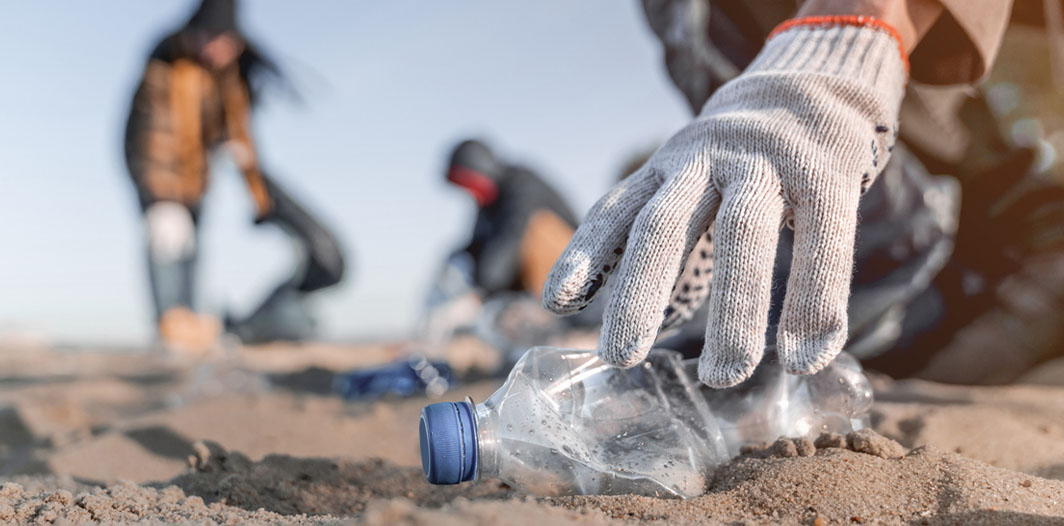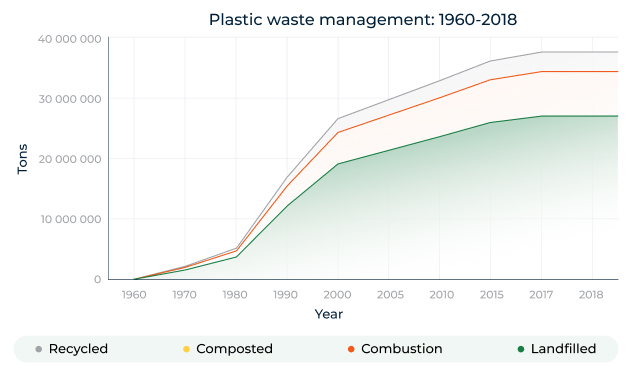The Problem With Plastic Recycling

Plastic is ubiquitous. It wraps the food we buy in the supermarket; it’s used to manufacture myriad parts, household products, toys, and even clothing. When a plastic item is no longer useful, most people throw it away, meaning it ends up in a landfill, where it can potentially poison the ground it’s buried in.
But even when people and businesses attempt to be responsible and follow proper waste protocols, unseen barriers abound. There are many different types of plastic, each with its own collection system and disposal method. As a result, it’s challenging to know whether recycling efforts are ethical, helpful, or a flat-out waste of time.
Containers and packaging represent the highest tonnage of all plastics. According to the World Economic Forum, 36% of all plastic produced is used for packaging, of which 85% end up in landfills. And while we are doing marginally better at recycling than we did in the 1970s and 80s, landfill capacities continue to rise at an alarming rate.

Image Source: EPA
Adding to the complexity, several countries have banned plastic recycling imports. Plastic that would have been destined for China or Turkey is now often sent to poorer countries, where it ends up in landfills. The Basel Convention, introduced in 1992, seeks, among other things, to mitigate this phenomenon by controlling the movement of hazardous and toxic waste, but the U.S. is not a signatory to the convention.
The Institute of Scrap Recycling Industries (ISRI), which advocates for the recycling industry, avers that most outgoing shipments of waste plastics conform to Basel standards. However, they also agree that non-compliant materials often slip through, especially following the unprecedented demand for single-use plastics in the wake of the pandemic.
According to a study published by the Proceedings of the National Academy of Sciences (PNAS), more than 8 million tons of pandemic-related plastic waste were generated in 2020 and 2021. Of that amount, 25,000 tons entered the world’s oceans. Inventory here includes plastic utensils, food packaging, plastic packaging from online shopping, PPE, and medical waste—the latter of which makes up the bulk of it. Though America may be behind targets regarding what they should be doing about plastic waste, many developing countries simply do not have the resources to deal with it. As a result, much of it accumulates on beaches and coastal waterways.
Incineration vs. Landfills
Plastic waste is a global issue due to the range of products it powers and its resistance to degradation. While it is often easier to throw plastic away, this inherent laziness feeds into the environmental disaster we face today.
When recycling is not an option, we have two choices: landfill or incineration.
Incineration is the process of burning waste, reducing the original product to ash. Due to toxic chemicals released during plastic incineration, this method is neither a solution nor an alternative to landfills. Emissions from burning plastics contain poisonous chemicals like lead, mercury, carbon monoxide, arsenic, PCBs, and more. The ash then makes its way into landfills, which can destroy local soil and waterways.
A landfill is an excavated area dedicated to trash disposal. Waste is brought to these areas and buried, isolating waste in designated sites. The benefits of this approach, hypothetically at least, include monitoring by organizations in charge of landfills to minimize pollution levels and contain harmful gasses.
The reality is much more sinister—especially when you consider what we send to our landfills. Should this trend continue, the surrounding environment could become saturated with harmful substances that can deoxygenate water and cause soil to become infertile, not to mention the increase in vermin, disease, and respiratory disorders often associated with landfill proximity.
The Challenges of Recycling Plastic
The problem with recycling plastic is that the majority of what people throw in recycling bins end up in landfills or worse. However, that fact is only one of the challenges that has led to the idea that plastic recycling is a myth. While recycling plastic is a good practice, there are other issues to explore and overcome.
Lack of Knowledge
End users being unaware of the different types of plastics and recycling processes contributes to inefficiency. For instance, plastic materials like polyethylene terephthalate (PET) are easily recyclable and are accepted by all recycling programs. Low-density polyethylene (LPDE) can be harder to process due to contamination from food or grease, meaning it often requires measures other than curbside recycling programs.
In some cases, people lack awareness about what plastics can be recycled and how to properly sort them. Even those who are trying to recycle can sometimes treat all types of plastics interchangeably. The confusion leads to contamination, where nonrecyclable items are mixed with recyclables. As a result, the recycling process becomes inefficient.
Plastic Design
A significant amount of plastic is manufactured in a way that makes recycling a challenge. Many products combine various types of plastics or include additives that complicate recycling processes.
Different types of polymer require specific conditions for recycling, which makes it impossible to clump them all together. As such, the materials need to be separated before processing to create new products. This process, otherwise known as mechanical recycling, is laborious and expensive. Ultimately, the way that many plastic products are designed leads to a high volume of waste, as many items cannot be effectively processed.
Recycled Plastics Are Downcycled
The processes of recycling plastics often degrade the overall quality of the plastic. In essence, most recycled plastics are downcycled and remade into lower-quality products. For example, a plastic bottle may be turned into a jacket, but that jacket cannot be recycled again into a bottle. Downcycling contributes to a growing waste problem, as the lifespan of recycled plastics is significantly reduced.
Plastics Are Not Circular
The current plastic recycling system is not truly circular. Circularity would mean that these materials are designed to be in use for as long as possible and can be continuously repurposed into new products instead of being discarded. The reality is that global plastic production is increasing at an alarming rate while recycling is decreasing. In fact, the U.S. recycles just 5% of plastic waste, while the majority ends up in landfills or incinerated.
In addition, the plastics that are recycled decline in quality and eventually end up becoming plastic waste. Plastic recycling processes can also be harmful, driving pollution and exposing people to toxic chemicals.
Recycled Plastics Are Toxic
Recycling plastic is an honest effort toward a more sustainable future, especially with the amounts being produced and ending up as waste. However, according to a report from Greenpeace USA, the recycling process actually increases the toxicity of plastics.
Recycled plastics can be directly contaminated by the toxic chemicals in virgin plastics or absorb these substances in the waste stream and the environment. The heating of plastics in the recycling process also generates new toxic chemicals that make their way into the new products.
5 Harmful Effects of Plastic Recycling
Recycling plastic products can contribute to:
- Release of toxic chemicals: The recycling process can release harmful chemicals. These emissions pose health risks to workers and nearby communities.
- Contamination of recycled materials: Contaminants from nonrecyclable plastics or food residues can compromise the quality of recycled materials. This contamination can render the recycled product unusable, leading to increased waste and reduced efficiency in recycling operations.
- Air pollution: Facilities that use advanced recycling, otherwise known as chemical recycling, release harmful pollutants into the air. This air pollution can contribute to respiratory issues and other health problems.
- Water pollution: Recycling plastic materials can pollute waterways with microplastic particles. Even with the proper precautions, like advanced water filters, in place, microplastics can still make their way into drinking and irrigation water.
- Decreased quality: Recycled plastics are often downcycled into lower-quality materials. This reduced quality means that recycled products may not be suitable for certain applications, including food packaging.
What Can You Do?
Even with all these challenging plastic recycling facts, recycling is a viable solution, but we all must take ownership of the process by:
- Choose more sustainable products, such as compostable materials for packaging
- Avoid single-use plastics and businesses/suppliers that still use them
- Replace single-use plastics with reusable alternatives
- Reduce reliance on heavily packaged products where possible
- Understand what can and cannot be recycled
- Learn about proper disposal methods for unrecyclable plastics
- Proactively leverage local recycling and safe disposal programs
Finally, holding companies accountable for their environmental impact will go a long way toward ensuring our planet stays healthy for future generations. By understanding proper plastic disposal methods, we do our part to make the world a better place.
Move Toward a Greener Tomorrow
There is a growing concern surrounding plastic production and the feasibility of recycling. Transitioning away from plastic is an excellent solution for combating the problem of plastic recycling, and Greenprint makes it possible. We offer a wide range of sustainable products that serve as eco-friendly alternatives to plastic. Partner with us to contribute to a healthier future.

References
- https://www.weforum.org/agenda/2022/06/recycling-global-statistics-facts-plastic-paper/
- https://www.epa.gov/facts-and-figures-about-materials-waste-and-recycling/plastics-material-specific-data
- http://www.basel.int/TheConvention/Overview/tabid/1271/Default.aspx
- https://www.isri.org/about-isri
- https://www.nytimes.com/2021/03/12/climate/plastics-waste-export-ban.html
- https://www.pnas.org/doi/10.1073/pnas.2111530118
- https://oceana.ca/en/blog/burning-plastic-is-not-a-recycling-solution-its-more-pollution/
- https://sciencing.com/effects-landfills-environment-8662463.html
- https://www.theguardian.com/us-news/2022/may/04/us-recycling-plastic-waste
- https://www.greenpeace.org/usa/forever-toxic/






